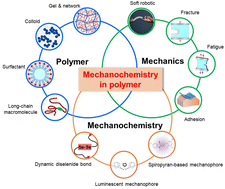Polymer mechanochemistry: from single molecule to bulk material
Abstract
The field of polymer mechanochemistry has experienced a renaissance over the past decades, primarily propelled by the rapid development of force-sensitive molecular units (i.e., mechanophores) and principles governing the reactivity of polymer networks for mechanochemical transduction or material strengthening. In addition to fundamental guidelines for converting mechanical energy input into chemical output, there has also been increasing focus on engineering applications of polymer mechanochemistry for specific functions, mechanically adaptive material systems, and smart devices. These endeavors are made possible by multidisciplinary approaches involving the development of multifunctional mechanophores for mechanoresponsive polymer systems, mechanochemical catalysis and synthesis, three-dimensional (3D) printed mechanochromic materials, reasonable design of polymer network topology, and computational modeling. The aim of this minireview is to provide a summary of recent advancements in covalent polymer mechanochemistry. We specifically focus on productive mechanophores, mechanical remodeling of polymeric materials, and the development of theoretical concepts.

- This article is part of the themed collections: Fundamental Basis of Mechanochemical Reactivity, 2023 PCCP HOT Articles and 2023 PCCP Reviews


 Please wait while we load your content...
Please wait while we load your content...